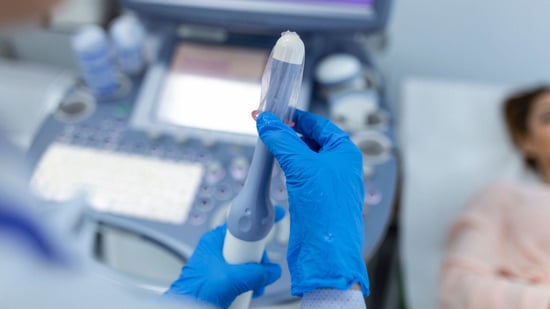What Is A Transvaginal Ultrasound & Does It Hurt?
July 19th, 2024 | 4 min. read

Some Ask Monica episodes may contain references to our previous name, RMA of CT. Learn more here.
In this article:
Vaginal vs. Abdominal Ultrasound
Ever wondered why you need to have a transvaginal ultrasound instead of an abdominal ultrasound? Let's discuss what a vaginal ultrasound can show us and why they're used.
Monica Moore:
Hi everyone. Welcome to this edition of Ask Monica. This is all about vaginal ultrasounds.
I think one of the main questions I hear from most people is, "Why do we have to do a transvaginal ultrasound or an ultrasound probe that goes in vaginally? Why can't we do an abdominal one?"
The simple answer? A transvaginal ultrasound allow us to see what's going on internally much better than an abdominal ultrasound would. Transvaginal simply means "through" or "across" the vagina.
What does a vaginal ultrasound show?
What we want to see really depends on where you are in your menstrual cycle.
Endometrial Lining Thickness
At the beginning of your cycle, we want to see that your endometrial lining has been shed.
This might mean that you're getting an ultrasound while you're on your period, which I know may feel a little awkward to you, but it's not weird at all for us, and it's actually ideal timing in terms of what we need to evaluate.
We don't care that you're bleeding. We don't care if you've shaved your legs or not.
We want to see that your ovaries are "quiet" and that there are no cysts or other issues that could potentially cause a disruption in follicular growth or your cycle.
Follicle (Egg) Development
Later on, vaginal ultrasound will be used in order to measure the progression of the follicles, or the fluid field cysts that hold the eggs. By measuring the diameter of the follicle, we're indirectly measuring the maturity of the egg.
If you're doing a cycle that involves an embryo transfer, what's going to be important is that your uterine lining has thickened. We want to see a pattern, a layering we refer to as trilaminar.
This means we can see three separate "lines" or layers of uterine lining by ultrasound, and shows us that your uterine lining is ready to receive an embryo.
Why are vaginal ultrasounds so important?
We really need to do transvaginal ultrasounds, because the probe goes to the back of the vagina (right underneath the cervix) really allows us to see everything that we need to see. It also allows us to document that you're exactly where you need to be in that specific cycle so we can time your treatment perfectly.
Sometimes, you may see abdominal ultrasound probes used during egg retrieval (which go on top of your stomach), but it's a little bit further away, a little bit more difficult to see.
Even after you become pregnant and return to your OB/GYN (around 10 weeks or so), transvaginal ultrasound will still be the best option.
Is vaginal ultrasound safe during pregnancy?
Yes, perfectly safe! They aren't harmful to you. It's just sound waves. They also aren't harmful during pregnancy, should you become pregnant. There's no reason to not do multiple, if necessary, transvaginal ultrasounds.
After the initial awkwardness and slight feeling of discomfort, most patients just feel a sense of pressure and are actually interested to see what's on the ultrasound screen.
Hope this was helpful and alleviates some anxiety for you!
Have a question about fertility?
Submit it here and we'll answer it in a future episode of Ask Monica.
Monica Moore is a board-certified Advanced Practice Nurse Practitioner, nurse educator and health coach who has been caring for patients at Illume Fertility for over 20 years. She is also the founder and lead educator at Fertile Health, LLC. Monica is passionate about taking care of the whole patient, believing in the importance of integrating comprehensive care. She has a special interest in PCOS and combating weight bias with education and advocacy.

